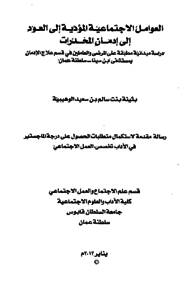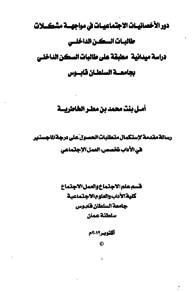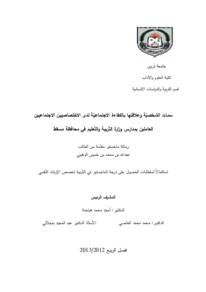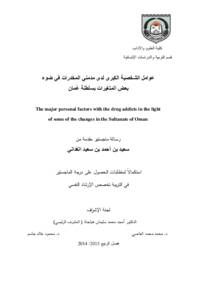وثيقة
العوامل الاجتماعية المؤدية إلى العود إلى إدمان المخدرات
عناوين أخرى
دراسة ميدانية مطبقة على المرضى و العاملين في قسم علاج الإدمان بمستشفى ابن سينا- سلطنة عمان
الناشر
جامعة السلطان قابوس
ميلادي
2012
اللغة
العربية
الملخص الإنجليزي
This study aims to find out the social factors leading to return to drug addiction; to identify the role of the social worker to help the recovered patient not to return to drug addiction, and to suggest the possible mechanism that can assist to limit the return to addiction.
The study is descriptive and depends on the social survey of all the 100 inpatient and out patient addicts who returned to addiction after they have received therapy at the Addiction Treatment Department existed in Ibn Sina Hospital during the period of data collection. The study also includes a purposely selected sample of the members of the medical team working in addiction therapy (15 persons). Therefore, two instruments for data were used: a questionnaire administered with those who returned to addiction and an interview schedule for the medical team working at the at the Addiction Therapy Department. The results of the research were obtained by using the SPSS program in the processing and statistical treatment of the data collected statistical treatment to reach to the results to an analyze them.
These treatments are represented in determination of frequencies and the related percentages, assuring the reliability of data collection tools by using Pearson correlation coefficient, and identifying the variation in the impact of the social factors on the return to the addiction according to some preliminary data, by using the One-Way (ANOVA) analysis for the multi-dimensional comparisons, The study has obtained a set of results with respect to the factors leading to the recurrence of addiction. The most important of these factors include the following:
1- Returning to the same environment and conditions that lead to addiction in the first place.
2- Leisure time and its use in a non-positive way.
3- Unemployment
4- Weaknesses in the rehabilitation program.
The study has reached a set of suggestion. The most important ones are:
-Raising therapy efficiency, developing the rehabilitation program, improving the service offered to the patients, and providing relaxed health environment in the clinic as a motivation to continue the therapy.
-Working on solving the social and economic problem of the recovered, in addition to providing them with rehabilitation program.
- Activating the role of the educational institutions in making students aware of the impacts of drugs, urge them to face the problem of return to addiction, and to work on expanding the plan to eliminate the illiteracy of parents.
-Activating the role of the security agencies to eradicate the problem of addiction and return to it through detecting the drug traffickers and intensifying the awareness program about the size of the problem of addiction and return to it.
- The need to expand the establishment of addiction therapy centres to include all the sultanate walaiat instead of a single centre and the established of a comprehensive rehabilitation centre equipped with all the means to help the recovered patients to acquire skills.
-The study recommends a set of mechanisms to implement the of the above-mentioned suggestions and proposes a framework for the role of the social worker in dealing with the patients recovered from drug addiction and helping them not to return to it.
المجموعة
URL المصدر
الملخص العربي
تهدف هذه الدراسة إلى التعرف على العوامل الاجتماعية المؤدية إلى العود إلى إيمان المخدرات، وكذلك التعرف على دور الأخصائي الاجتماعي في مساعدة المتعافين على عدم العود إلى إدمان المخدرات واقتراح الآليات التي من شأنها أن تساعد على الحد من العود إلى إدمان المخدرات. وتنتمي هذه الدراسة إلى نمط الدراسات الوصفية، وقد اعتمدت على منهج المسح الاجتماعي؛ حيث شملت كافة المدمنين العائدين إلى الإدمان المعالجين في قسم علاج الإدمان الملحق بمستشفى ابن سينا، سواء أكانوا من الموجودين في العيادة الداخلية أم المراجعين في العيادة الخارجية خلال فترة جمع البيانات، وقد بلغ عددهم (۱۰۰ مفردة).
كما شملت عينة عملية من أعضاء فريق العمل الطبي العامل في قسم علاج الإدمان، وبلغ عددهم (۱۰ مفردة)، واستخدمت الباحثة أداتي استبار العائدين إلى الإدمان، ودليل المقابلة لفريق العمل الطبي العامل في قسم علاج الإدمان. فيما اعتمدت الباحثة في دراستها على برنامج الحزم الإحصائية (SPSS) في عملية تفريغ البيانات، وإجراء المعالجات الإحصائية للوصول إلى النتائج وتحليلها، وتتمثل هذه المعالجات في تحديد التكرارات والنسب المئوية المرتبطة، والتأكد من ثبات أدوات جمع البيانات باستخدام معامل ارتباط (بيرسون)، وللتعرف على مدى اختلاف تأثير العوامل الاجتماعية على العود للإدمان وفقا لبعض البيانات الأولية، وذلك باستخدام تحليل التباين الأحادي (One Way Anova) المقارنات المتعددة البعدية، وقد توصلت الدراسة إلى مجموعة من النتائج من أهمها:
1- أن عامل الرجوع إلى نفس البيئة والظروف السابقة المهيئة للعود إلى الإدمان من أهم العوامل الاجتماعية المتعلقة بالمجتمع والمؤدية إلى العود إلى الإدمان.
۲- أن عامل وقت الفراغ، وعدم استغلال الوقت بشكل إيجابي من أهم العوامل الاجتماعية العائدة للمتعافين ذاتهم والمؤدية إلى العود للإدمان.
3- أن عامل عدم الحصول على عمل أو وظيفة من أهم العوامل الاجتماعية المتعلقة ببيئة عمل المتعافين والمؤدية إلى العود إلى الإدمان.
4- أن عامل ضعف برامج التأهيل من أهم العوامل الاجتماعية المتعلقة بعلاج المتعافين والمؤدية إلى عودهم إلى إدمان المخدرات.
وقد توصلت الدراسة إلى مجموعة من المقترحات من أهمها:
- رفع كفاءة العلاج، وتطوير برامج التأهيل، والعمل على تحسين الخدمات المقدمة للمرضى، وتوفير البيئة الصحة المريحة لهم في العيادة بما يسهم في ترغيبهم بمتابعة العلاج.
- العمل على حل المشكلات الاجتماعية والاقتصادية للمتعافين، وتقديم البرامج التأهيلية لهم.
- تفعيل دور المؤسسات التعليمية في توعية الطلاب بآثار المخدرات، وحثهم على مواجهة مشكلة العود للإدمان، والعمل على توسيع خطة مكافحة أمنية الآباء والأمهات.
- تفعيل دور الجهات الأمنية في القضاء على مشكلة الإدمان والعود، وذلك من خلال الكشف عن تجار المخدرات، وتكثيف البرامج التوعوية عن حجم مشكلة الإدمان والعود له.
- ضرورة التوسع في إنشاء المراكز العلاجية لعلاج الإدمان؛ بحيث تشمل جميع ولايات السلطنة بدلا من مركز علاجي واحد، وإنشاء مركز تأهيلي شامل، به كافة السبل لمساعدة المتعافين على اكتساب المهارات.
كما وضعت الدراسة مجموعة من الآليات الإجرائية لتنفيذ مقترحات الدراسة، وبناء على نتائج الدراسة قامت الباحثة بوضع تصور لدور الأخصائي الاجتماعي مع المتعافين من الإدمان لمساعدتهم على عدم العود
كما شملت عينة عملية من أعضاء فريق العمل الطبي العامل في قسم علاج الإدمان، وبلغ عددهم (۱۰ مفردة)، واستخدمت الباحثة أداتي استبار العائدين إلى الإدمان، ودليل المقابلة لفريق العمل الطبي العامل في قسم علاج الإدمان. فيما اعتمدت الباحثة في دراستها على برنامج الحزم الإحصائية (SPSS) في عملية تفريغ البيانات، وإجراء المعالجات الإحصائية للوصول إلى النتائج وتحليلها، وتتمثل هذه المعالجات في تحديد التكرارات والنسب المئوية المرتبطة، والتأكد من ثبات أدوات جمع البيانات باستخدام معامل ارتباط (بيرسون)، وللتعرف على مدى اختلاف تأثير العوامل الاجتماعية على العود للإدمان وفقا لبعض البيانات الأولية، وذلك باستخدام تحليل التباين الأحادي (One Way Anova) المقارنات المتعددة البعدية، وقد توصلت الدراسة إلى مجموعة من النتائج من أهمها:
1- أن عامل الرجوع إلى نفس البيئة والظروف السابقة المهيئة للعود إلى الإدمان من أهم العوامل الاجتماعية المتعلقة بالمجتمع والمؤدية إلى العود إلى الإدمان.
۲- أن عامل وقت الفراغ، وعدم استغلال الوقت بشكل إيجابي من أهم العوامل الاجتماعية العائدة للمتعافين ذاتهم والمؤدية إلى العود للإدمان.
3- أن عامل عدم الحصول على عمل أو وظيفة من أهم العوامل الاجتماعية المتعلقة ببيئة عمل المتعافين والمؤدية إلى العود إلى الإدمان.
4- أن عامل ضعف برامج التأهيل من أهم العوامل الاجتماعية المتعلقة بعلاج المتعافين والمؤدية إلى عودهم إلى إدمان المخدرات.
وقد توصلت الدراسة إلى مجموعة من المقترحات من أهمها:
- رفع كفاءة العلاج، وتطوير برامج التأهيل، والعمل على تحسين الخدمات المقدمة للمرضى، وتوفير البيئة الصحة المريحة لهم في العيادة بما يسهم في ترغيبهم بمتابعة العلاج.
- العمل على حل المشكلات الاجتماعية والاقتصادية للمتعافين، وتقديم البرامج التأهيلية لهم.
- تفعيل دور المؤسسات التعليمية في توعية الطلاب بآثار المخدرات، وحثهم على مواجهة مشكلة العود للإدمان، والعمل على توسيع خطة مكافحة أمنية الآباء والأمهات.
- تفعيل دور الجهات الأمنية في القضاء على مشكلة الإدمان والعود، وذلك من خلال الكشف عن تجار المخدرات، وتكثيف البرامج التوعوية عن حجم مشكلة الإدمان والعود له.
- ضرورة التوسع في إنشاء المراكز العلاجية لعلاج الإدمان؛ بحيث تشمل جميع ولايات السلطنة بدلا من مركز علاجي واحد، وإنشاء مركز تأهيلي شامل، به كافة السبل لمساعدة المتعافين على اكتساب المهارات.
كما وضعت الدراسة مجموعة من الآليات الإجرائية لتنفيذ مقترحات الدراسة، وبناء على نتائج الدراسة قامت الباحثة بوضع تصور لدور الأخصائي الاجتماعي مع المتعافين من الإدمان لمساعدتهم على عدم العود
قالب العنصر
الرسائل والأطروحات الجامعية






